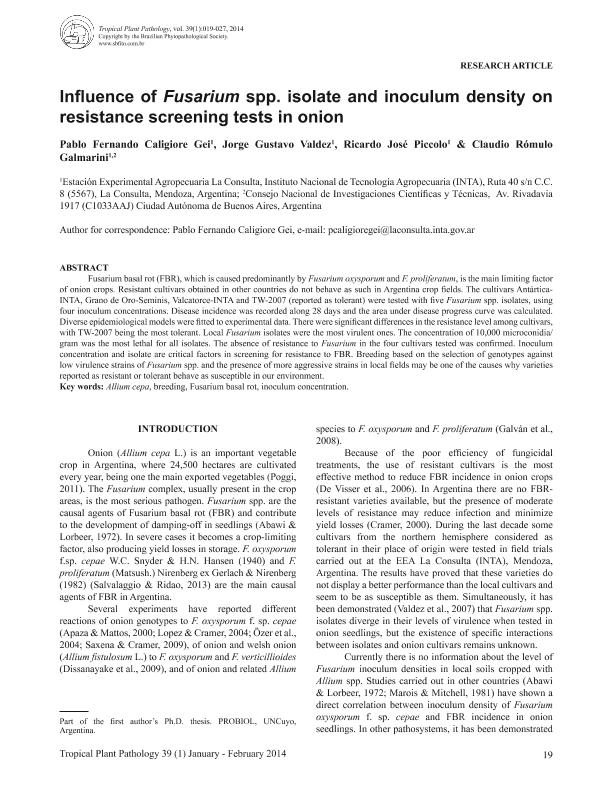Artículo
Influence of Fusarium spp. isolate and inoculum density on resistance screening tests in onion
Caligiore Gei, Pablo Fernando ; Valdez, Jorge Gustavo; Piccolo, Ricardo José; Galmarini, Claudio Romulo
; Valdez, Jorge Gustavo; Piccolo, Ricardo José; Galmarini, Claudio Romulo
 ; Valdez, Jorge Gustavo; Piccolo, Ricardo José; Galmarini, Claudio Romulo
; Valdez, Jorge Gustavo; Piccolo, Ricardo José; Galmarini, Claudio Romulo
Fecha de publicación:
02/2014
Editorial:
Sociedad Brasileira Fitopathologia
Revista:
Tropical Plant Pathology
ISSN:
1982-5676
e-ISSN:
1983-2052
Idioma:
Inglés
Tipo de recurso:
Artículo publicado
Clasificación temática:
Resumen
Fusarium basal rot (FBR), which is caused predominantly by Fusarium oxysporum and F. proliferatum, is the main limiting factor of onion crops. Resistant cultivars obtained in other countries do not behave as such in Argentina crop fields. The cultivars AntárticaINTA, Grano de Oro-Seminis, Valcatorce-INTA and TW-2007 (reported as tolerant) were tested with five Fusarium spp. isolates, using four inoculum concentrations. Disease incidence was recorded along 28 days and the area under disease progress curve was calculated. Diverse epidemiological models were fitted to experimental data. There were significant differences in the resistance level among cultivars, with TW-2007 being the most tolerant. Local Fusarium isolates were the most virulent ones. The concentration of 10,000 microconidia/ gram was the most lethal for all isolates. The absence of resistance to Fusarium in the four cultivars tested was confirmed. Inoculum concentration and isolate are critical factors in screening for resistance to FBR. Breeding based on the selection of genotypes against low virulence strains of Fusarium spp. and the presence of more aggressive strains in local fields may be one of the causes why varieties reported as resistant or tolerant behave as susceptible in our environment. Key words: Allium cepa, breeding, Fusarium basal rot, inoculum concentration.
Palabras clave:
Allium Cepa L.
,
Fusarium Basal Rot
,
Breeding
,
Screening
,
Inoculum Concentration
Archivos asociados
Licencia
Identificadores
Colecciones
Articulos(CCT - MENDOZA)
Articulos de CTRO.CIENTIFICO TECNOL.CONICET - MENDOZA
Articulos de CTRO.CIENTIFICO TECNOL.CONICET - MENDOZA
Citación
Caligiore Gei, Pablo Fernando; Valdez, Jorge Gustavo; Piccolo, Ricardo José; Galmarini, Claudio Romulo; Influence of Fusarium spp. isolate and inoculum density on resistance screening tests in onion; Sociedad Brasileira Fitopathologia; Tropical Plant Pathology; 39; 1; 2-2014; 19-27
Compartir



